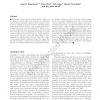Free Online Productivity Tools
i2Speak
i2Symbol
i2OCR
iTex2Img
iWeb2Print
iWeb2Shot
i2Type
iPdf2Split
iPdf2Merge
i2Bopomofo
i2Arabic
i2Style
i2Image
i2PDF
iLatex2Rtf
Sci2ools
JOCN
2010
2010
Electrophysiological Correlates of Complement Coercion
■ This study examined the electrophysiological correlates of complement coercion. ERPs were measured as participants read and made acceptability judgments about plausible coerced sentences, plausible noncoerced sentences, and highly implausible animacy-violated sentences (“The journalist began/wrote/ astonished the article before his coffee break”). Relative to noncoerced complement nouns, the coerced nouns evoked an N400 effect. This effect was not modulated by the number of possible activities implied by the coerced nouns (e.g., began reading the article; began writing the article) and did not differ in either magnitude or scalp distribution from the N400 effect evoked by the animacy-violated complement nouns. We suggest that the N400 modulation to both coerced and animacy-violated complement nouns reflected different types of mismatches between the semantic restrictions of the verb and the semantic properties of the incoming complement noun. This is consistent with models hol...
| Added | 28 Jan 2011 |
| Updated | 28 Jan 2011 |
| Type | Journal |
| Year | 2010 |
| Where | JOCN |
| Authors | Gina R. Kuperberg, Arim Choi, Neil Cohn, Martin Paczynski, Ray Jackendoff |
Comments (0)

